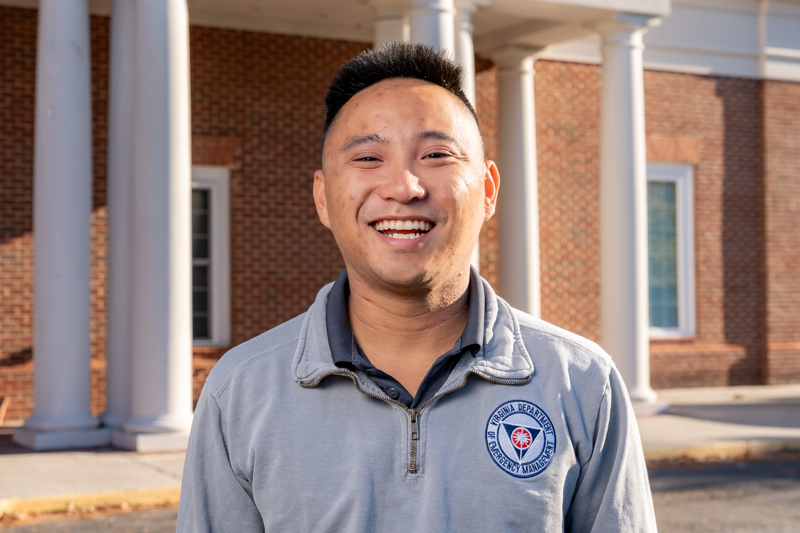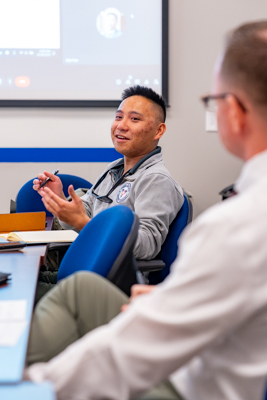
Read time:

Before Alex Tran was a master of disaster, he was a Captain.
When Tran, ‘22 Political Science and Criminology, graduated, he traded serene campus life for a career that is the antithesis of calm. He now spends his days anticipating calamity, residing in a world of worst case scenarios.
Tran is a regional exercise project coordinator for the Virginia Department of Emergency Management (VDEM), and his career is powered by preparing stakeholders across the Commonwealth for the possibility of dark days. He thrives on constant stress, looming deadlines, and confronting persistent and downright scary “what ifs.”
“This was truly my dream job out of college. Having the opportunity to serve the entire state is truly an honor,” he said.
Most days, Tran is on the road, training and readying workers in state offices and universities for potentially disastrous circumstances: active threats, storms, fires, and any other dangers that could transpire. Each year, he orchestrates more than 40 meticulously planned scenarios designed to give professionals around the state the chance to act out and learn from real-life emergencies. His goal is simple yet critical: ensuring readiness for any situation and providing people with the right tools to survive.
Tran credits his Christopher Newport education and what he learned as a Captain - the importance of collaboration and strong interpersonal skills - for helping power his career success. Classes, he said, built an educational foundation that proved priceless as he transitioned to the work world.
“CNU emphasized learning outside the class and my experience on campus is a great example of what you can do if you take advantage of the opportunity while you are in school,” he said.
Recently, Tran returned to Christopher Newport to plan a critical incident event that involved a simulated shooting in McMurran Hall. He transformed the campus he once walked as a student into a classroom for emergency preparedness.
“McMurran Hall is where I took the majority of my classes while I was a student,” he said. “Looking back at my time as a Captain fueled my drive to make sure that this exercise provided all responders with an environment that promoted preparedness and collaboration.”
Tran spent months organizing the full-scale exercise, making sure every detail was covered and all possible twists or turns were addressed. Using the campus as the exercise backdrop added an element of both familiarity and protectiveness. His job was to boost safety at a place he loves–a place that helped shape him into the person he is today.
“Being an alum added an extra layer to this project,” he said. “It was a full circle experience. As a Captain for Life, you always want to stay engaged with your alma mater. I was able to return to campus in my professional role and contribute to the overall prepared effort. It was truly rewarding.”
Bryan Donohue, Director of Emergency Management at CNU, praised Tran’s tireless efforts to make the exercise as realistic and effective as possible, calling his dedication to his job and alma mater impressive.
“Alex is a consummate professional and team builder. He has developed a wealth of experience and proficiency in a very short time with VDEM. We are better off as a result of his talent and passion for serving the community,” Donohue said.
Tran works to ensure that people are not only ready for any turn of events, but that they are confident and comfortable in how they react.
“While we hope that these incidents we prepare for will never happen, I know that the first responders who serve the campus community and the greater city are prepared,” he said. “Unfortunately, it’s sometimes not a matter of ‘if’ but ‘when’ something will happen. We want to provide our responder with a no-fault learning environment to identify mistakes and strengths.”
To perform emergency management effectively requires Tran to be willing to travel at a moment's notice and to be level-headed and open to learning. He often finds himself navigating a variety of challenges in real time.
“The biggest thing about this field is being flexible,” he said. “It is both rewarding and humbling to work with professionals who will drop everything when called upon to support the state.”
Tran’s journey into the world of disaster preparedness began in earnest at CNU. During Welcome Week as a freshman, there was a presentation that included information about the University’s Department of Emergency Management and what it does on campus. He left the presentation feeling like a fire in him had been ignited, that he had discovered his true calling.
Tran was able to secure an internship with the department just before the ultimate crisis happened: the COVID pandemic. Everything changed, and he found himself in the middle of a whirlwind of emergencies.
“I had the opportunity to support various projects for the (CNU) Department of Emergency Management, which gave me practical skills that went beyond what any classroom experience can teach you,” he said.
Tran’s role was elevated quickly, and he took on the job of supporting vaccine clinics on campus. It gave him a taste of operating under pressure in a critical role with the potential to impact the masses. Most would run from the stress, he embraced it. Tran quickly realized he operated most efficiently when he could focus on transforming chaos into calm. In fact, he decided then that he would seek a career in emergency management. He was on a mission to be the boss of bedlam, or at least the person who could keep it at bay.
“I have always enjoyed a fast-paced environment. I enjoy being on a time crunch and my best work is always done under pressure,” he said.
After graduating, Tran was immediately hired as a regional exercise project coordinator, and since then has been helping state stakeholders - such as CNU - stay safe and prepared.
Tran’s role goes beyond planning. Occasionally, he is called to the trenches of actual disasters to help communities respond and recover. Recently, he spent weeks in Southwest Virginia assisting with Hurricane Helene relief efforts, using his expertise, resources and prowess to craft plans to help rebuild the devastated region.
“This has probably been the largest event I have supported since joining the state. I am very thankful to be able to support the survivors of Southwest Virginia. It has been a gratifying experience and while we are through the initial sprint of emergency response, we still have a long way to go when it comes to recovery operations,” he said.
Working for the state has given him an opportunity to apply everything he learned at Christopher Newport, both in and out the classroom.
Tran was involved on campus as a tour guide, fraternity president, and president of the SCUBA club. He figured out early on how to successfully juggle activities. His career trajectory taught him to lean heavily on his liberal arts education, a lesson he eagerly passes on to other Captains.
“Durable skills, a foundation of liberal arts, and a generalist mindset will amplify your future beyond campus,” he said. “Build and leverage your network through peer-to-peer exchanges to fuel both personal and professional growth. Take your time. Many race through their four years on campus, but there’s a long road ahead after graduation. Don’t rush - enjoy the journey.”